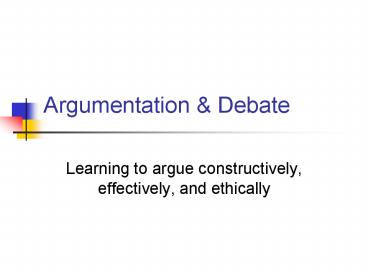Argumentation - PowerPoint PPT Presentation
1 / 44
Title:
Argumentation
Description:
2nd AFF Constructive 10 minutes. 2nd NEG Constructive 10 minutes. 1st NEG Rebuttal 5 minutes ... 2nd AFF Rebuttal 5 minutes. Cross-examination Debate ... – PowerPoint PPT presentation
Number of Views:287
Avg rating:3.0/5.0
Title: Argumentation
1
Argumentation Debate
- Learning to argue constructively, effectively,
and ethically
2
What is an argument?
3
What is an argument?
- Advancing and supporting claims in an attempt to
influence the opinions of others.
4
The Procedural Norms of arguing
5
The Procedural Norms of arguing
- Cooperativeness
6
The Procedural Norms of arguing
- Cooperativeness
- Bilaterality
7
The Procedural Norms of arguing
- Cooperativeness
- Bilaterality
- Reflective judgment
8
Why is arguing frequently regarded as a hostile,
rather than a cooperative activity?
9
Forms of Debate
10
Forms of Debate
- Political debate, public events
11
Forms of Debate
- Political debate, public events
- Legal debate
12
Forms of Debate
- Political debate, public events
- Legal debate
- Parliamentary debate
13
Forms of Debate
- Political debate, public events
- Legal debate
- Parliamentary debate
- Nonformal debate, scholarly debate
14
Forms of Debate
- Political debate, public events
- Legal debate
- Parliamentary debate
- Nonformal debate, scholarly debate
- Academic debate
15
Assumptions underlying educational debate (ED)
16
Assumptions underlying educational debate (ED)
- ED is free of a particular subject matter
17
Assumptions underlying educational debate (ED)
- ED is free of a particular subject matter
- ED is a cooperative activity
18
Assumptions underlying educational debate (ED)
- ED is free of a particular subject matter
- ED is a cooperative activity
- ED depends upon the notion that humans should be
rational beings
19
Why has debate prospered in an educational
setting?
20
Of what importance are the skills of debate to a
democratic society?
21
Values of Educational Debate
22
Debate provides preparation for effective
participation in free society
- Voting
- The judicial system
- Organizational decision-making
23
Debate offers preparation for leadership
24
Debate provides for investigation analysis of
significant issues
- CETA Job training
- EPA Nuclear regulation the environment
- Star Wars A federal program to develop space
25
Debate develops proficiency in critical thinking
- Emphasizes a logical approach
- Emphasizes supporting evidence
- Emphasizes a critical search for fallacies in
reasoning
26
Debate integrates knowledge areas
27
Debate develops proficiency in listening
28
Debate develops proficiency in purposeful inquiry
29
Debate emphasizes quality teaching
- Individual attention to students
- Tutorial help
- Interactive teaching (give take)
- Immediate feedback to improve performance
30
Debate promotes student scholarship
31
Debate develops the ability to make prompt,
analytical responses
32
Debate develops proficiency in writing
33
Debate encourages mature judgment
- See all sides of an issue
- Understand how inquiry and analysis can change
points of view - Encourages a scientific approach to problem
solving
34
Debate develops courage
35
Debate encourages effective speech composition
and delivery
36
Debate encourages effective speech composition
and delivery
But NOT tournament debate!!
37
Debate develops social maturity
- Tolerate disagreement without effect to personal
relationships - Accept decisions without argument
- Learn to adapt self-expression to a rigid system
of rules and time contraints - Learn debate manners
- Learn the value of teamwork
38
Debate Formats
- Debate can be either team (2 person) debate or
Lincoln Douglas (individual) debate.
39
Lincoln Douglas debate
Most often involves questions of value rather
than policy--more on that later
40
Affirmative Constructive 6 minutes Cross
examination 3 minutes Negative Constructive 7
minutes Cross examination 3 minutes Affirmative
rebuttal 4 minutes Negative rebuttal 6
minutes Affirmative rebuttal 3 minutes
41
Standard Debate
1st AFF Constructive 10 minutes 1st NEG
Constructive 10 minutes 2nd AFF Constructive 10
minutes 2nd NEG Constructive 10 minutes 1st NEG
Rebuttal 5 minutes 1st AFF Rebuttal 5
minutes 2nd NEG Rebuttal 5 minutes 2nd AFF
Rebuttal 5 minutes
42
Cross-examination Debate
- Same as standard except that each constructive is
followed by a cross examination period and time
limits for all speeches are slightly reduced.
43
Preparation Time
- Prep time is an expendable resource that allows
debaters to take time-out before speeches in
order to prepare.
44
Typical abbreviations
- 1AC First affirmative constructive
- 2NC Second negative constructive
- 2NR Second negative rebuttal
- CX Cross examination































